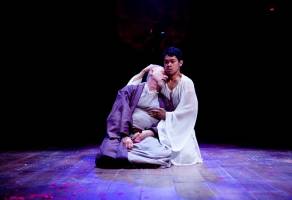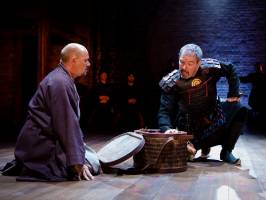The Orphan of Zhao (British Production)
Genre: drama (in English)
Produced by Royal Shakespeare Company, Britain, 2012.
© Royal Shakespeare Company - This data is made available for non-commercial research and educational use only. Under the terms of Equity licencing, audio-visual data will be removed in 2022.
Adaptation: James Fenton
Director: Gregory Doran
Designer: Niki Turner
Performers: Jeremy Avis, Stephen Ventura, Joe Dixon, Philip Whitchurch, Patrick Romer, James Tucker, Lloyd Hutchinson, Matthew Aubrey, Adam Burton, Youssef Kerkour, Siu Hun Li, Joan Iyiola, Lucy Briggs-Owen, Susan Momoko Hingley, Graham Turner, Nia Gwynne, Jake Fairbrother, Chris Lew Kum Hoi
Background to the production:
The Royal Shakespeare Company called their winter season 2012 “A World Elsewhere”. During this season, the RSC looked beyond Shakespeare and attempted to discover what was happening around the globe during Shakespeare’s life time. The RSC assembled an ethnically diverse company to present three world classics, Chinese play The Orphan of Zhao was one of them; the other two were Alexander Pushkin’s Boris Godunov and Bertolt Brecht’s A Life of Galileo.
The Orphan of Zhao was the first Chinese play that the RSC had ever presented, and it was the first play Gregory Doran directed as the Artistic Director of the company. The first performance of the production took place on 30 October 2012 at the Swan Theatre, Stratford-upon-Avon.
Scenario:
(Taken from the Programme)
The Emperor and his favourite minister Tu’an Gu are committed to be pursuit of pleasure. Three good counsellors, Zhao Dun, Gongsun Chujiu and Wei Jiang, remonstrate with the Emperor about his excesses. Gongsun is banished, Wei Jiang exiles himself but Zhao Dun, who is married to the Emperor’s daughter, decides to stay. Tu’an Gu plots against Zhao Dun and finally massacres his clan and forces the minster to kill himself, leaving behind pregnant wife. Tu’an Gu has the Princess guarded until she gives birth. If she has a son, he will be killed.
Dr Cheng Ying comes to deliver the Princess’s baby. However, she has already given birth and pleads with him to smuggle the boy out. When Tu’an Gu realises that the orphan of Zhao has escaped, he decrees that unless the baby is returned every male child born in that month will be killed. Cheng Ying seeks the advice of Gongsun and they agree to double-bluff Tu’an Gu by leaving Cheng Ying’s son – who is the same age as the orphan – with Gongsun, who then encourages Cheng Ying to denounce him to Tu’an Gu. Tu’an Gu raids Gongsun’s house and kills the baby, believing it to be the orphan. Tu’an Gu, as reward for Cheng Ying’s good’ deed, decides to adopt his son, unaware he is the orphan.
Eighteen years pass. Wei Jiang is informed that the Emperor is dying and returns to the capital to prevent Tu’an Gu from usurping the throne.
Cheng Bo (the orphan, now grown) begins to realise that terrible abuses are being committed by the Emperor and Tu’an Gu. He feels a conflict of loyalty between the two ‘fathers’. One day, he meets the Princess. Cheng Ying finally reveals the orphan’s true identity by means of a painted scroll.
-James Fenton
Up to this point, the British adaptation generally follows the Chinese plot. However, there is a new epilogue, in which Cheng Ying and the ghost of his son meet. This gives the neglected figure in all Chinese Orphan productions, Cheng Ying’s sacrificed son, a voice. It also offers adapters (the scriptwriter, director and all the performers) a way to complete Cheng Ying’s journey. The whole play ends as follows:
Cheng Ying
My wronged son, my love, place your cold hand here in the fold of my gown, and show me how to hold the knife. I do not lack courage but I doubt my strength and skill. Help me to die.
Ghost
The moon is sharp on the blade. Hold it here below the rib. And if you do truly love me, I shall taste it in your heart’s blood.
Cheng Ying
Place your hand on my hand. Help me direct the blade.
Ghost
There. The Ghost tastes the heart’s blood.
You love me. You always did love me.
And now you belong to me for ever.
[Ends.]
-James Fenton, The Orphan of Zhao, Faber and Faber, 2012, p. 70.
Images and the video are courtesy of Royal Shakespear Company.
《赵氏孤儿》(英国版)
剧种:戏剧(英语)
演出单位:皇家莎士比亚剧团
改编:James Fenton
导演: Gregory Doran
设计:Niki Turner
演员: Jeremy Avis, Stephen Ventura, Joe Dixon, Philip Whitchurch, Patrick Romer, James Tucker, Lloyd Hutchinson, Matthew Aubrey, Adam Burton, Youssef Kerkour, Siu Hun Li, Joan Iyiola, Lucy Briggs-Owen, Susan Momoko Hingley, Graham Turner, Nia Gwynne, Jake Fairbrother, Chris Lew Kum Hoi
关于2012年英国版《赵氏孤儿》:
皇家莎士比亚剧团把2012年冬令演出季命名为:“他人的世界”。在这个演出季里,剧团望眼于莎士比亚之外,即,在莎士比亚生活的那个年代里,世界上其他的戏剧作品。这一演出季的演员剧团由不同人种组成,排演了三部世界名著,除了中国的《赵氏孤儿》以外,另外两部作品是普希金的《鲍里斯戈多诺夫》与布莱希特的《伽利略传》。
《赵氏孤儿》是皇家莎士比亚剧团上演的第一部中国戏剧,也是Gregory Doran上任剧团艺术总监以后导演的第一部作品。《赵氏孤儿》首演于2012年10月30日斯特拉福镇的天鹅剧院。
剧情简介:
(从节目册中摘录:)
皇帝与他钟爱的大臣屠岸贾醉心于玩乐。另有三位优秀的官员:赵盾、公孙杵臼与魏绛批评了皇帝的恣意胡为,于是公孙杵臼被罢免,魏绛自动离开首都,而赵盾决定留下,他实际上是皇帝的女婿。屠岸贾设计陷害赵盾,并且最终屠杀了赵氏全部家族成员,也逼得赵盾自杀。赵氏全族只留下了怀有身孕的公主一人。屠岸贾对她严密看守,声称如果公主产出男婴,那么这个男孩也会被处死。
程婴医生来宫廷为公主接生,他来到时,孩子已经生出。公主哀求程婴把男婴偷偷带出宫苑。当屠岸贾发现孩子已经逃离了他的手心,于是下令如果赵家的男孩不被送回,他将杀死全国所有在同一个月出生的男婴。程婴找公孙杵臼商量对策,二人决定迷惑奸臣:把程婴亲生的、与赵氏孤儿一样年龄的男婴送到公孙处,再由程婴向屠岸贾举报公孙藏匿赵氏的婴孩。屠岸贾抄了公孙的家,杀死了婴儿(以为杀死的是赵氏的骨血),同时,为嘉奖程婴举报有功,认程婴的儿子为养子,并不知道其实这个孩子才是真正的赵氏孤儿。
18年过去了。魏绛听说皇帝病危,决定返回首都,以防屠岸贾篡位夺权。
程勃(当年的孤儿,现已长大成人)开始意识到皇帝和屠岸贾有很多祸国殃民的行为,但是同时,他也为自己对于两个父亲之间的情感而感到矛盾。程婴最终决定用一幅图画向程勃说出当年的历史。
- 詹姆士芬顿(英语改编本的作者)
至此为止,英语改编本的剧情基本上完全按照中国原剧的发展。但是,该剧有一个全新的尾声。在尾声里,程婴去儿子的墓地,与儿子的鬼魂有一场对话。这一尾声给予了这个在所有中国《赵氏孤儿》演出中被并不出现的人物,即,被献出去的程婴的亲子与父亲对话的机会,(一般来说,中国演出里的这个男婴以一个抱在公主的手里的 、裹在襁褓里的“假孩子” 道具出现)。同时,正是这个尾声使得英国改编者(编剧、导演和演员)得以让程婴有了一个完整的“行程”。剧本最后的结尾如下:
程 婴
可怜的孩子,我的宝贝,把你冰冷的手放到我怀里,教我该怎么握刀。我不是没有勇气,但我怀疑我的能力。帮我。
鬼 魂
霜刃映着月光。把刀放在这儿,这根肋骨下面。如果你真的爱我,从你心头流出的鲜血,我能尝到你的爱。
程 婴
握着我的手。帮我对准。
鬼 魂
去吧。【鬼魂尝了尝程婴心头的鲜血。】
你爱我。你一直都爱我。从现在起,你永远都属于我了。
【完。】
-翻译:陈恬,《影视评论》,2014年第1期
诚挚感谢英国皇家莎士比亚剧团提供图片与录像。


